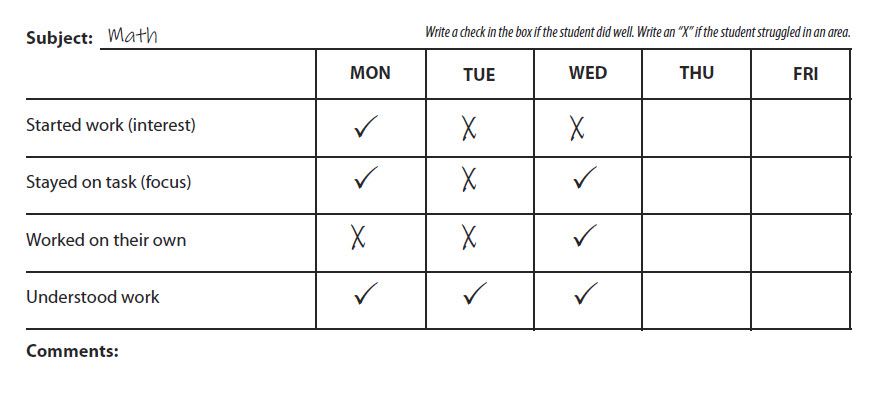How to communicate Concerns with your child's school |
Step 1: Keep DataBy the end of a week, it can be hard to remember which lessons went well and which didn't. It's even harder if you are working with more than one child. That's why keeping data is your friend. If the idea of keeping data sounds scary to you, don't worry. We have a free download that can help. | Step 2: Check InCheck in with your child's teacher weekly to stay on the same page. If you can't talk to your child's teacher during their office hours, send an email. | Step 3: Don't be AshamedMany children have behavior problems right now. Your child may refuse to do school work. They may throw computers or destroy school supplies. It's important to tell your child's teacher if your child is having these kinds of problems. Learn why. |
Step 1: Keep DataKeeping data can remind you what happened during the week. It's also a great way to keep your child's teacher in the loop. Your school may have its own data sheet. If not, we created this one to help you. To use this data sheet:
Use each section for a new subject, special (art, music or gym) or therapy. If your child does well, write a check in the box. If your child struggles, write an X. Example
Here's an example of a student who struggled with math.
On Monday, the student started his math without arguing. He stayed on task. He did need help to get through the problems. Overall, the parent felt that their child understood his math homework. Tuesday was rough. The child didn't want to start work. He also struggled to stay focused. The parent helped with the problems but still felt that their child understood the assignment. On Wednesday, the student didn't want to start work. Once he did, he was able to focus and complete the work all by himself. | Tip: No Printer?You can make the same data sheet we have on the website using a piece of notebook paper. Write each of the four areas on a separate line. Divide the rest of the page into five columns (one for each day). Repeat this for each subject. Tip: More Than Four Subjects?If your child has more than four subjects per day, make extra copies of page two. Tip: Sending Data to Teachers
To share your data with your child's teacher, take a photo and email it. |
Step 3: Don't be Ashamed to Ask for HelpMany families are struggling with behavior problems related to school work. We also know from talking with CFK families that lots of us feel ashamed because of it. One family said that their kindergartener turned the laptop off in a middle of a speech therapy session. The family of a 12-year-old shared how their child hid under the desk for a Zoom with her teacher. Other families say that their children are hitting, bothering siblings who are on task, and throwing tantrums. There are many reasons why your child might be misbehaving. Your child's teacher can help you to adjust work -- but only if they know you are having trouble. | Remember: Your child isn't bad; they're communicating with behaviorOur children have gone through a tremendous amount of trauma:
Behavior is one way that your child may be sharing these feelings. When your child goes through periods of challenging behavior, it's important to communicate with your child's teacher. Teachers may be able to change work loads or help you find other ways to help. |
